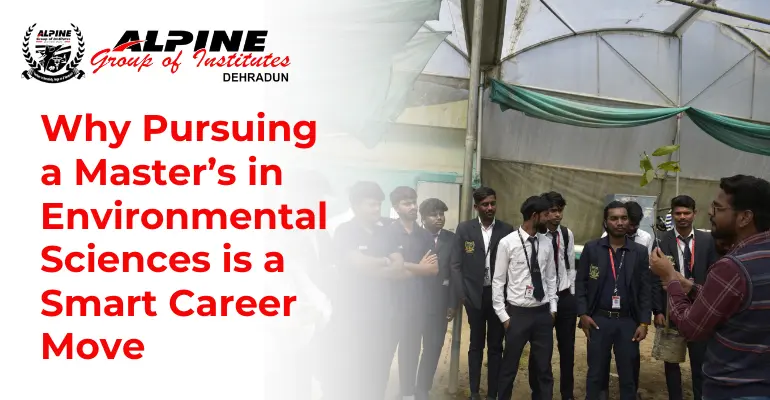Why Pursuing A Master’s In Environmental Sciences Is A Smart Career Move
2024-12-16 10:26Why Pursuing A Master’s In Environmental Sciences Is A Smart Career Move
In recent years, the world has witnessed an increasing urgency to address environmental challenges. From climate change to biodiversity loss and resource depletion, environmental issues are more pressing than ever. As a result, the demand for skilled professionals who can navigate these complex challenges has surged. One of the best ways to position yourself at the forefront of this movement is by pursuing a Master’s in Environmental Sciences.
1. Rising Global Environmental Concerns
Environmental problems are no longer distant issues; they are immediate and global. Governments, NGOs, businesses, and individuals are increasingly prioritizing sustainability and environmental protection. As concerns about air pollution, climate change, and waste management grow, there is a significant demand for professionals who can provide solutions to these challenges.
A Master’s in Environmental Science provides you with the advanced knowledge and skills needed to tackle these issues head-on. From understanding climate dynamics to creating sustainable resource management strategies, this degree equips you with the expertise that is highly sought after in today’s job market.
2. Expanding Job Opportunities
The environmental sector is experiencing rapid growth, and a Master’s in Environmental Sciences opens doors to a wide range of career opportunities. Professionals with an advanced degree can work in various fields, including:
- Environmental Consulting: Advising businesses and governments on sustainable practices, compliance with environmental laws, and implementing green technologies.
- Renewable Energy: Working in the growing field of sustainable energy, from solar and wind power to bioenergy.
- Environmental Policy and Advocacy: Shaping policies that promote environmental conservation and sustainability.
- Research and Development: Conducting critical research that drives innovations in environmental technologies and practices.
- Corporate Sustainability: Helping companies integrate environmental sustainability into their business operations and reduce their ecological footprints.
These career paths not only offer job stability but also the opportunity to work in a field that makes a tangible difference in the world.
3. A Competitive Edge in the Job Market
A Master’s in Environmental Sciences gives you an edge over other candidates who may have a bachelor’s degree or less specialized training. With the added expertise gained through advanced coursework, research, and practical experience, you are more likely to land high-level positions with better salaries and more responsibilities.
Employers seek individuals who have a deep understanding of the environment, sustainability, and the complex issues that affect both the natural world and human societies. By obtaining a master’s degree, you demonstrate to potential employers that you have the knowledge, passion, and commitment to solving environmental problems.
4. Work in Cutting-Edge, Impactful Fields
The environmental sciences field is dynamic and constantly evolving. With new technologies and approaches emerging regularly, environmental professionals are at the forefront of innovation. For instance, advancements in renewable energy technologies, green building practices, and environmental monitoring are transforming the way we approach sustainability.
A Master’s in Environmental Sciences allows you to delve into these cutting-edge areas. Whether you are developing new methods to reduce carbon emissions, studying ecosystems to protect endangered species, or working on policies to mitigate climate change, you will be part of an exciting and impactful field.
5. Contributing to Global Sustainability Goals
The world has set ambitious goals to address climate change and sustainability, such as the United Nations Sustainable Development Goals (SDGs). These goals focus on key areas like clean water and sanitation, affordable and clean energy, life on land and below water, and climate action.
As an environmental sciences graduate, you will be well-positioned to contribute to these global efforts. Whether working with international organizations, governmental agencies, or private corporations, you can be part of solutions that have a direct impact on achieving these important goals.
6. Networking and Professional Growth
A Master’s in Environmental Sciences also provides valuable networking opportunities. During your studies, you will interact with professionals, professors, and fellow students who are passionate about environmental issues. Many programs offer internship opportunities, fieldwork, and connections with industry leaders, which can help you build relationships that last long after graduation.
Moreover, the academic experience itself fosters critical thinking, collaboration, and problem-solving, all of which are vital in environmental careers. As you continue to grow in your profession, the connections and knowledge you gain from your master’s program will be instrumental in advancing your career.
7. Making a Meaningful Impact
One of the most rewarding aspects of pursuing a Master’s in Environmental Sciences is the opportunity to make a meaningful impact on the planet. As a graduate, you can work to protect natural ecosystems, advocate for policies that promote environmental justice, and help communities adapt to the challenges posed by climate change.
Whether you work in conservation, policy, or research, your efforts can have lasting effects on the well-being of future generations. This sense of purpose and fulfillment is a key driver for many professionals in the field.
Conclusion: A Smart Investment for Your Future
In a world facing environmental challenges, the need for skilled professionals in environmental sciences has never been greater. Pursuing a Master’s in Environmental Sciences not only opens up a wealth of career opportunities but also allows you to be part of the solution to some of the most critical issues of our time.
The growing demand for environmental professionals, combined with the potential for professional growth, networking, and the ability to make a difference, makes this degree a smart and impactful career move. If you are passionate about the environment and want to be at the forefront of sustainability efforts, this is the perfect time to invest in a Master’s in Environmental Sciences.






